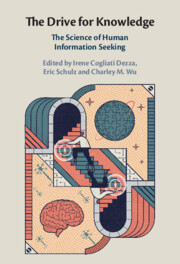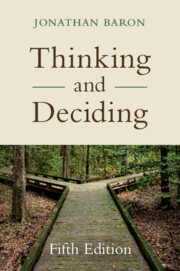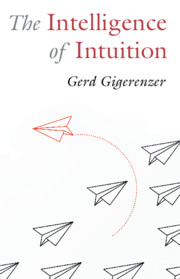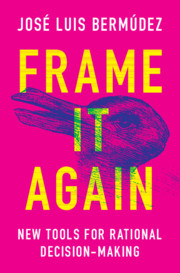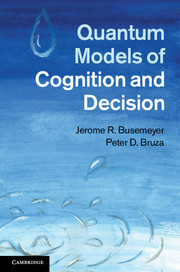The Drive for Knowledge
The Science of Human Information Seeking
$35.99 USD
- Editors:
- Irene Cogliati Dezza, University College London
- Eric Schulz, Max-Planck-Institut für biologische Kybernetik, Tübingen
- Charley M. Wu, Eberhard-Karls-Universität Tübingen, Germany
- Date Published: May 2022
- availability: This ISBN is for an eBook version which is distributed on our behalf by a third party.
- format: Adobe eBook Reader
- isbn: 9781009032896
Find out more about Cambridge eBooks
$
35.99 USD
Adobe eBook Reader
Other available formats:
Paperback, Hardback
Looking for an inspection copy?
This title is not currently available on inspection
-
Humans constantly search for and use information to solve a wide range of problems related to survival, social interactions, and learning. While it is clear that curiosity and the drive for knowledge occupies a central role in defining what being human means to ourselves, where does this desire to know the unknown come from? What is its purpose? And how does it operate? These are some of the core questions this book seeks to answer by showcasing new and exciting research on human information-seeking. The volume brings together perspectives from leading researchers at the cutting edge of the cognitive sciences, working on human brains and behavior within psychology, computer science, and neuroscience. These vital connections between disciplines will continue to lead to further breakthroughs in our understanding of human cognition.
Read more- Brings together scholars from psychology, computer science, and neuroscience
- Provides an account of the computational, algorithmic, and neurological basis for information-seeking
- Sets out a comprehensive framework for a fully-fledged science of human information-seeking
Reviews & endorsements
'Why do we want to know what we want to know? This remarkable collaboration weaves together insights from a new wave of science uncovering what motivates us to seek information about the unknown. An enriching and thought-provoking read both for experts and newcomers to the field.' Ethan Bromberg-Martin, Washington University in St. Louis, USA
See more reviews'This book is an intellectual feast, brimming with delights for researchers from many fields. While grounded in rigorous computational theory, the chapters do not shy away from big questions about fuzzier concepts like curiosity, play, interestingness, and intrinsic motivation. The inquisitive reader will not be disappointed.' Sam Gershman, Harvard University, USA
'Curiosity - the drive for knowledge and information - is one of the most fundamental and important human characteristics. But, until recently, we haven't really understood that drive for knowledge scientifically. This volume brings together the results of a fascinating and cutting-edge interdisciplinary research program, including motivation and cognition, development and decision-making, computation, and neuroscience. The book, which includes the leaders in this new field, gives a new perspective on the ancient and profound question of human curiosity and will be essential reading for researchers across a wide range of disciplines who are curious about curiosity.' Alison Gopnik, University of California at Berkeley, USA
'Research on information seeking is rapidly emerging as a unifying force in cognitive science - one that seeks to explain how humans and animals build and refine their models of the world. By integrating mathematical models with psychology and neuroscience, this fascinating new volume provides a concise overview of the motivations and mechanisms that support information search, and highlights the pervasive role our thirst for information (and misinformation) plays in human society.' Stephen Fleming, University College London, UK
'This book will be of value to researchers interested in the brain and behavior, whether working in disciplines related to psychology (e.g., cognitive science, neuropsychology) or in computer science. … Recommended.' G. C. Gamst, Choice
Customer reviews
Not yet reviewed
Be the first to review
Review was not posted due to profanity
×Product details
- Date Published: May 2022
- format: Adobe eBook Reader
- isbn: 9781009032896
- availability: This ISBN is for an eBook version which is distributed on our behalf by a third party.
Table of Contents
Preface Cogliati Dezza ,Schulz and Wu, Part I. What Drives Humans to Seek Information?:
1. The motivational processes of sense-making Zachary Wojtowicz, Nicholas Chater, George Loewenstein
2. From curiosity to interest: Accumulated knowledge supports long-term persistence of information-seeking behavior Ed Donnellan, Michiko Sakaki, Kou Murayama
3. Curiosity-driven exploration: diversity of mechanisms and functions Alexander Ten, Pierre-Yves Oudeyer, Clément moulin-Frier
4. Searching for information, from infancy to adolescence Costanza De Simone and Azzurra Ruggeri
Part II. How do Humans Search for Information?:
5. What makes a good query? Prospects for a comprehensive theory of human information acquisition Björn Meder, Vincenzo Crupi, Jonathan D. Nelson
6. Active inference, Bayesian optimal design and expected utility Noor Sajid, Lancelot Da Costa, Thomas Parr and Karl Friston
7. Exploration beyond bandits Franziska Braendle, Marcel Binz and Eric Schulz
8. Representational exchange in human social learning: Balancing efficiency and flexibility Charley Wu, Natalia Vélez and Fiery Cushman
Part III. Which machinery supports the drive for knowledge?:
9. Information-seeking in the brain Caroline J. Charpentier and Irene Cogliati Dezza
10. Attention as rational choice Jacqueline Gottlieb
11. Seeking inner knowledge: Foraging in semantic space Thomas T. Hills, Nancy B. Lundin, Mahi Luthra and Peter M. Todd
12. Edgework: Viewing curiosity as fundamentally relational Perry Zurn, Dale Zhou, David M Lydon-Staley and Danielle S. Bassett
Future directions Cogliati Dezza, Schulz and Wu.
Sorry, this resource is locked
Please register or sign in to request access. If you are having problems accessing these resources please email [email protected]
Register Sign in» Proceed
You are now leaving the Cambridge University Press website. Your eBook purchase and download will be completed by our partner www.ebooks.com. Please see the permission section of the www.ebooks.com catalogue page for details of the print & copy limits on our eBooks.
Continue ×Are you sure you want to delete your account?
This cannot be undone.
Thank you for your feedback which will help us improve our service.
If you requested a response, we will make sure to get back to you shortly.
×
